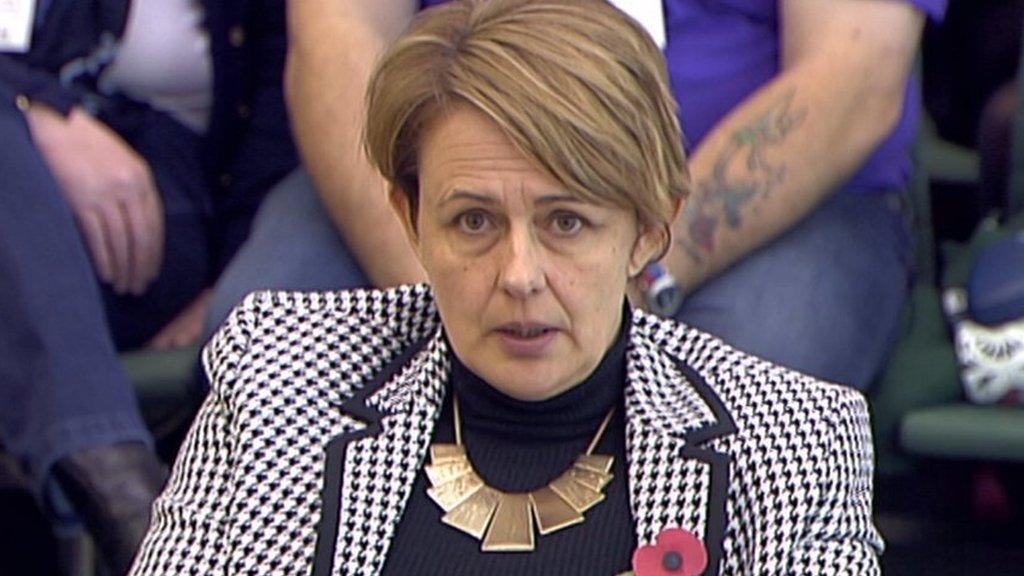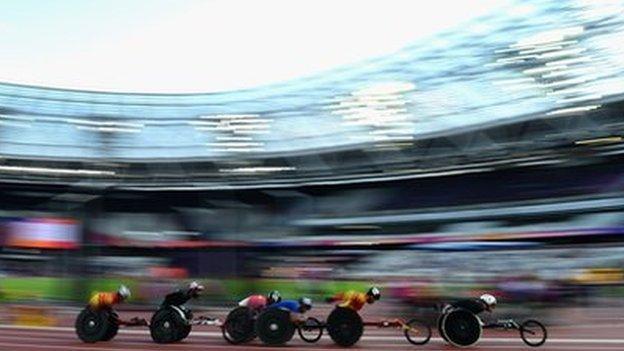Paralympic classification: Everyone is cheating system, says former chief executive
- Published
MPs were told athletes were threatened with not being selected - Dan Roan reports
A leading sports administrator said "everyone was at it" when he was warned about abuse of the Para-sport classification system, MPs were told.
The revelation is in written evidence submitted to Tuesday's parliamentary committee hearing by Charlie Bethel, the former chief executive of British Wheelchair Basketball.
Bethel warned the chief executive of "a very large national governing body" that he had been made aware of "inappropriate behaviour" in the classification of a Paralympic athlete.
"I was told - after being told I knew nothing about classification - that everyone was at it,'" Bethel wrote.
The qualified classifier also told MPs on the Department of Culture, Media and Sport (DCMS) Select Committee that the same official had asked funding agency UK Sport to "to take control of the media with regard to when they raise concerns and challenges to certain sports classification".
Bethel spent 15 years as chief executive of British Wheelchair Basketball before stepping down in June. He is a member of the Board of the International Wheelchair Basketball Federation.
In his submission, he spoke of "an apathy and lack of understanding" and said it was clear to him "that there is the wrong culture and a complete lack of knowledge" among those running certain sports.
"I can only put this attitude down to ignorance," Bethel wrote. "It would be incomprehensible for such an attitude toward something similar in able-bodied sport, such as doping or masking a heavyweight as a featherweight in boxing.
"Classification is the soul of Paralympic sport... but I have witnessed attitudes and approaches in established Paralympic sports which are of concern and it is this that motivated me to write."
IPC 'really concerned' by 'kangaroo court' claims
Is Paralympic sport classification fit for purpose?
Bethel's comment emerged on the day when the International Paralympic Committee (IPC) labelled the parliamentary hearing as "like a kangaroo court".
IPC spokesman Craig Spence also criticised the testimony of Michael Breen, father of T38 long jump world champion Olivia, describing him as "a bully".
Breen recounted a conversation with British Para-athletics head coach Paula Dunn in which he said she suggested Paralympic sprint champion Sophie Hahn was competing in the wrong category.
Spence said Breen "was positioned as an expert when he's a disgruntled father". Breen responded by calling Spence's comments "ill-advised and unprofessional".
In a statement to BBC Sport he added: "I am surprised that Spence has made this comment. The IPC ought to be neutral in this. I will not stoop to his level."
And Damian Collins, the chair of the select committee, tweeted, external: "The IPC should have come and given evidence themselves, as they were invited to but declined to do."
Breen also said athletes were afraid to speak out about concerns with the classification system because they had been "intimidated and bullied".
And 11-time Paralympic champion Baroness Tanni Grey-Thompson - who also spoke at the hearing - said she had heard of British athletes being threatened with not being selected if they spoke out.
She described the situation as "somewhere between bullying and control".
Spence told BBC Sport the IPC was "really concerned" by the claims.
He added: "There should be processes where athletes can speak without fear and we will work with the British Paralympic Association to rectify that.
"But what we are unhappy about is there was not significant questioning of Breen. In May 2016, Breen gave the IPC a list of athletes he had concerns about. We investigated every single one and identified they were in the correct class.
"To continue with that witch hunt is wrong, and I think he came across as a bit of a bully."
- Published31 October 2017

- Published31 October 2017
